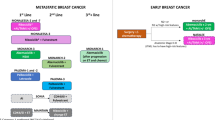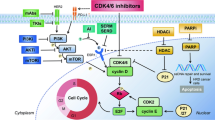Abstract
Purpose of Review
To describe the clinical role of CDK 4/6 inhibitors in hormone receptor-positive (HR+) metastatic breast cancer (HR+ MBC) as well as current controversies and evolving areas of research.
Recent Findings
Palbociclib, ribociclib, and abemaciclib are each approved in combination with an aromatase inhibitor or fulvestrant for HR+ MBC. Abemaciclib is also approved as monotherapy for pre-treated patients. Key questions in the field include whether all patients with HR+ MBC should receive a CDK 4/6 inhibitor up front versus later line, impact on overall survival, role of continued CDK 4/6 blockade, mechanism of clinical resistance, and treatment sequencing.
Summary
The development of CDK 4/6 inhibitors has changed the therapeutic management of HR+ MBC. Additional research is needed to determine optimal treatment sequencing, understand mechanisms governing resistance, and develop novel therapeutic strategies to circumvent or overcome clinical resistance and further improve the outcomes of patients with MBC.
Similar content being viewed by others
References
Papers of particular interest, published recently, have been highlighted as: • Of importance
Nurse P, Masui Y, Hartwell L. Understanding the cell cycle. Nat Med. 1998;4:1103–6.
Sherr CJ. Cancer cell cycles. Science. 1996;274:1672–7.
Malumbres M. Therapeutic opportunities to control tumor cell cycles. Clin Transl Oncol. 2006;8:399–408.
Hunt T, Nasmyth K, Novák B. The cell cycle. Philos Trans R Soc Lond Ser B Biol Sci. 2011;366:3494–7.
Weinberg RA. The retinoblastoma protein and cell cycle control. Cell. 1995;81:323–30.
Wang JY, Knudsen ES, Welch PJ. The retinoblastoma tumor suppressor protein. Adv Cancer Res. 1994;64:25–85.
Butt AJ, McNeil CM, Musgrove EA, Sutherland RL. Downstream targets of growth factor and oestrogen signalling and endocrine resistance: the potential roles of c-Myc, cyclin D1 and cyclin E. Endocr Relat Cancer. 2005;12:S47–59.
Musgrove EA, Lee CS, Buckley MF, Sutherland RL. Cyclin D1 induction in breast cancer cells shortens G1 and is sufficient for cells arrested in G1 to complete the cell cycle. Proc Natl Acad Sci U S A. 1994;91:8022–6.
Nair BC, Vadlamudi RK. Regulation of hormonal therapy resistance by cell cycle machinery. Gene Ther Mol Biol. 2008;12:395.
Altucci L, Addeo R, Cicatiello L, Germano D, Pacilio C, Battista T, et al. Estrogen induces early and timed activation of cyclin-dependent kinases 4, 5, and 6 and increases cyclin messenger ribonucleic acid expression in rat uterus. Endocrinology. 1997;138:978–84.
Geum D, Sun W, Paik SK, Lee CC, Kim K. Estrogen-induced cyclin D1 and D3 gene expressions during mouse uterine cell proliferation in vivo: differential induction mechanism of cyclin D1 and D3. Mol Reprod Dev. 1997;46:450–8.
Thangavel C, Dean JL, Ertel A, Knudsen KE, Aldaz CM, Witkiewicz AK, et al. Therapeutically activating RB: reestablishing cell cycle control in endocrine therapy-resistant breast cancer. Endocr Relat Cancer. 2011;18:333–45.
Toogood PL, Harvey PJ, Repine JT, Sheehan DJ, VanderWel SN, Zhou H, et al. Discovery of a potent and selective inhibitor of cyclin-dependent kinase 4/6. J Med Chem. 2005;48:2388–406.
Finn RS, Crown JP, Lang I, Boer K, Bondarenko IM, Kulyk SO, et al. The cyclin-dependent kinase 4/6 inhibitor palbociclib in combination with letrozole versus letrozole alone as first-line treatment of oestrogen receptor-positive, HER2-negative, advanced breast cancer (PALOMA-1/TRIO-18): a randomised phase 2 study. Lancet Oncol. 2015;16:25–35.
Dickler MN, Tolaney SM, Rugo HS, Cortés J, Diéras V, Patt D, et al. MONARCH 1, a phase II study of Abemaciclib, a CDK4 and CDK6 inhibitor, as a single agent, in patients with refractory HR + /HER2 − metastatic breast Cancer. Clin Cancer Res. 2017;23:5218–24.
• Hortobagyi GN, Stemmer SM, Burris HA, Yap Y-S, Sonke GS, Paluch-Shimon S, et al. Ribociclib as First-Line Therapy for HR-Positive, Advanced Breast Cancer. N Engl J Med. 2016;375:1738–48. Pivotal phase III trial leading to FDA approval of ribociclib as first-line therapy for HR+ MBC.
• Finn RS, Martin M, Rugo HS, Jones S, Im S-A, Gelmon K, et al. Palbociclib and Letrozole in Advanced Breast Cancer. N Engl J Med. 2016;375:1925–36. Pivotal phase III trial leading to FDA approval of palbociclib as first-line therapy for HR+ MBC.
• Goetz MP, Toi M, Campone M, Sohn J, Paluch-Shimon S, Huober J, et al. MONARCH 3: Abemaciclib As Initial Therapy for Advanced Breast Cancer. J Clin Oncol. 2017;35:3638–46. Pivotal phase III trial leading to FDA approval of abemaciclib as first-line therapy for HR+ MBC.
• Slamon DJ, Neven P, Chia S, Fasching PA, De Laurentiis M, Im S-A, et al. Phase III Randomized Study of Ribociclib and Fulvestrant in Hormone Receptor-Positive, Human Epidermal Growth Factor Receptor 2-Negative Advanced Breast Cancer: MONALEESA-3. J Clin Oncol. 2018;36:2465–72. Pivotal phase III trial leading to FDA approval of ribociclib in combination with fulvestrant for HR+ MBC.
• Sledge GW, Toi M, Neven P, Sohn J, Inoue K, Pivot X, et al. MONARCH 2: Abemaciclib in Combination With Fulvestrant in Women With HR+/HER2- Advanced Breast Cancer Who Had Progressed While Receiving Endocrine Therapy. J Clin Oncol. 2017;35:2875–84. Pivotal phase III trial leading to FDA approval of abemaciclib in combination with fulvestrant for HR+ MBC.
• Turner NC, Ro J, André F, Loi S, Verma S, Iwata H, et al. Palbociclib in Hormone-Receptor–Positive Advanced Breast Cancer. N Engl J Med. 2015;373:209–19. Pivotal phase III trial leading to FDA approval of palbociclib in combination with fulvestrant for HR+ MBC.
Cristofanilli M, Turner NC, Bondarenko I, Ro J, Im S-A, Masuda N, et al. Fulvestrant plus palbociclib versus fulvestrant plus placebo for treatment of hormone-receptor-positive, HER2-negative metastatic breast cancer that progressed on previous endocrine therapy (PALOMA-3): final analysis of the multicentre, double-blind, phase 3 randomised controlled trial. Lancet Oncol. 2016;17:425–39.
• Tripathy D, Im S-A, Colleoni M, Franke F, Bardia A, Harbeck N, et al. Ribociclib plus endocrine therapy for premenopausal women with hormone-receptor-positive, advanced breast cancer (MONALEESA-7): a randomised phase 3 trial. Lancet Oncol. 2018;19:904–15. This is the only phase III trial of a CDK 4/6 inhibitor that entirely focuses on pre-menopausal women.
Asghar U, Witkiewicz AK, Turner NC, Knudsen ES. The history and future of targeting cyclin-dependent kinases in cancer therapy. Nat Rev Drug Discov. 2015;14:130–46.
Malumbres M, Sotillo R, Santamaría D, Galán J, Cerezo A, Ortega S, et al. Mammalian cells cycle without the D-type cyclin-dependent kinases Cdk4 and Cdk6. Cell. 2004;118:493–504.
Gelbert LM, Cai S, Lin X, Sanchez-Martinez C, Del Prado M, Lallena MJ, et al. Preclinical characterization of the CDK4/6 inhibitor LY2835219: in-vivo cell cycle-dependent/independent anti-tumor activities alone/in combination with gemcitabine. Investig New Drugs. 2014;32:825–37.
Singh H, Howie LJ, Bloomquist E, Wedam S, Amiri-Kordestani L, Tang S, et al. Abstract GS5–06: A U.S. food and drug administration pooled analysis of outcomes of older women with hormone-receptor positive metastatic breast cancer treated with a CDK4/6 inhibitor as initial endocrine based therapy. Cancer Res. 2018;78:GS5–06-GS5–06.
Robertson JFR, Bondarenko IM, Trishkina E, Dvorkin M, Panasci L, Manikhas A, et al. Fulvestrant 500 mg versus anastrozole 1 mg for hormone receptor-positive advanced breast cancer (FALCON): an international, randomised, double-blind, phase 3 trial. Lancet. 2017;388:2997–3005.
Verma S, Bartlett CH, Schnell P, DeMichele AM, Loi S, Ro J, et al. Palbociclib in combination with fulvestrant in women with hormone receptor-positive/HER2-negative advanced metastatic breast cancer: detailed safety analysis from a multicenter, randomized, placebo-controlled, phase III study (PALOMA-3). Oncologist. 2016 Oct;21(10):1165–75.
Finn R, Crown J, Lang I, Boer K. Overall survival results from the randomized phase II study of palbociclib (P) in combination with letrozole (L) vs letrozole alone for frontline treatment of ER+/HER2– advanced breast cancer (PALOMA-1; TRIO-18). J Clin Oncol. 2017;35(15_suppl; abstr 1001). https://doi.org/10.1200/JCO.2017.35.15_suppl.1001.
Turner NC, Slamon DJ, Ro J, Bondarenko I, Im SA, Masuda N, et al. Overall Survival with Palbociclib and Fulvestrant in Advanced Breast Cancer. N Engl J Med. 2018;379:(20):1926–36. https://www.ncbi.nlm.nih.gov/pubmed/30345905. Accessed 15 Nov 2018.
Baselga J, Campone M, Piccart M, Burris HAI, Rugo HS, Sahmoud T, et al. Everolimus in postmenopausal hormone-receptor–positive advanced breast Cancer. N Engl J Med. 2012;366:520–9.
Turner NC, André F, Cristofanilli M, Verma S, Iwata H, Loi S, et al. Abstract P4–22-06: Treatment postprogression in women with endocrine-resistant HR+/HER2- advanced breast cancer who received palbociclib plus fulvestrant in PALOMA-3. Cancer Res. 2017;77:P4–22-06-P4–22–06.
Finn RS, Dering J, Conklin D, Kalous O, Cohen DJ, Desai AJ, et al. PD 0332991, a selective cyclin D kinase 4/6 inhibitor, preferentially inhibits proliferation of luminal estrogen receptor-positive human breast cancer cell lines in vitro. Breast Cancer Res BCR. 2009;11:R77.
Herrera-Abreu MT, Palafox M, Asghar U, Rivas MA, Cutts RJ, Garcia-Murillas I, et al. Early adaptation and acquired resistance to CDK4/6 inhibition in estrogen receptor–positive breast Cancer. Cancer Res. 2016;76:2301–13.
Caldon CE, Sergio CM, Kang J, Muthukaruppan A, Boersma MN, Stone A, et al. Cyclin E2 overexpression is associated with endocrine resistance but not insensitivity to CDK2 inhibition in human breast Cancer cells. Mol Cancer Ther. 2012;11:1488–99.
Yang C, Li Z, Bhatt T, Dickler M, Giri D, Scaltriti M, et al. Acquired CDK6 amplification promotes breast cancer resistance to CDK4/6 inhibitors and loss of ER signaling and dependence. Oncogene. 2017;36:2255–64.
• Condorelli R, Spring L, O’Shaughnessy J, Lacroix L, Bailleux C, Scott V, et al. Polyclonal RB1 mutations and acquired resistance to CDK 4/6 inhibitors in patients with metastatic breast cancer. Ann Oncol. 2018;29:640–5. This is the first clinical report of RB1 mutation mediating clinical resistance to CDK 4/6 inhibitor.
• O’Leary B, Cutts RJ, Liu Y, Hrebien S, Huang X, Fenwick K, et al. The Genetic Landscape and Clonal Evolution of Breast Cancer Resistance to Palbociclib plus Fulvestrant in the PALOMA-3 Trial. Cancer Discov. 2018;8:1390–403. A comprehensive manuscript describing various mechanisms of resistance to CDK 4/6 inhibitors.
Wander SA, et al. Whole exome sequencing (WES) in hormone-receptor positive (HR+) metastatic breast cancer (MBC) to identify mediators of resistance to cyclin-dependent kinase 4/6 inhibitors (CDK4/6i). 2018. [cited 2018 Nov 9]; Available from: https://meetinglibrary.asco.org/record/161446/abstract. Accessed 17 Jan 2019.
Goel S, DeCristo MJ, Watt AC, BrinJones H, Sceneay J, Li BB, et al. CDK4/6 inhibition triggers anti-tumour immunity. Nature. 2017;548:471–5.
Pan H, Gray R, Braybrooke J, Davies C, Taylor C, McGale P, et al. 20-year risks of breast-Cancer recurrence after stopping endocrine therapy at 5 years. N Engl J Med. 2017;377:1836–46.
Ma CX, Gao F, Luo J, Northfelt DW, Goetz M, Forero A, et al. NeoPalAna: neoadjuvant Palbociclib, a cyclin-dependent kinase 4/6 inhibitor, and Anastrozole for clinical stage 2 or 3 estrogen receptor–positive breast Cancer. Clin Cancer Res. 2017;23:4055–65.
Martin M, Hurvitz SA, Chan D, Fernandez-Abad M, Petru E, Rostorfer R, et al. Abstract PD5–01: Final results of NeoMONARCH: A phase 2 neoadjuvant study of abemaciclib in postmenopausal women with hormone receptor positive (HR+), HER2 negative breast cancer (BC). Cancer Res. 2018;78:PD5–01-PD5–01.
Author information
Authors and Affiliations
Corresponding author
Ethics declarations
Conflict of Interest
Laura M. Spring has received compensation from Novartis for service as a consultant and participation on advisory boards.
Seth A. Wander has received compensation from Foundation Medicine and InfiniteMD for service as a consultant and from Eli Lilly for participation on advisory boards.
Mark Zangardi declares that he has no conflict of interest.
Aditya Bardia has received research funding (paid to his institution) from Genentech, Novartis, Pfizer, Merck, Sanofi, Radius Health, Immunomedics, Mersana Therapeutics, Innocrin, and Biotheranostics; has received compensation from Pfizer, Novartis, Genentech, Merck, Radius Health, and Immunomedics for service as a consultant and participation on advisory boards and steering committees; and has received compensation from Spectrum Pharmaceuticals and Taiho Pharmaceutical for service as a consultant and participation on advisory boards.
Human and Animal Rights and Informed Consent
This article does not contain any studies with human or animal subjects performed by any of the authors.
Additional information
Publisher’s Note
Springer Nature remains neutral with regard to jurisdictional claims in published maps and institutional affiliations.
This article is part of the Topical Collection on Breast Cancer
Rights and permissions
About this article
Cite this article
Spring, L.M., Wander, S.A., Zangardi, M. et al. CDK 4/6 Inhibitors in Breast Cancer: Current Controversies and Future Directions. Curr Oncol Rep 21, 25 (2019). https://doi.org/10.1007/s11912-019-0769-3
Published:
DOI: https://doi.org/10.1007/s11912-019-0769-3




